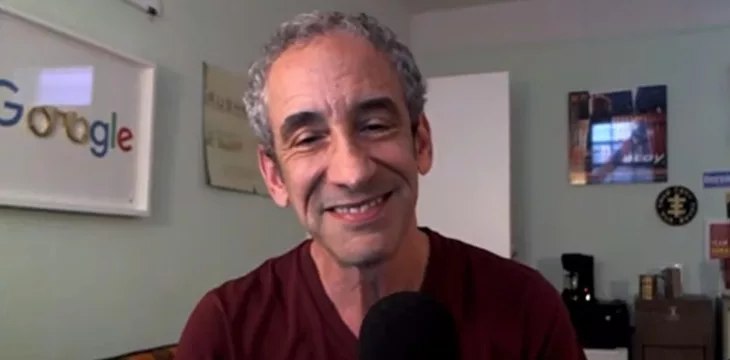|
Getting your Trinity Audio player ready...
|
Douglas Rushkoff has been following technology and media for more than 30 years – ever since, as a young theatre director, he decided he’d had enough of its elitist culture: “theatres started to feel very predictable …I was really looking for something more participatory. Interactive. Unknown. Unpredictable.”
It was the late 1980s, and there was a new medium that fitted the bill. “My strangest friends from college, the weirdest, most theatrical, Grateful-Dead-head, acid freak colleagues ended up moving out to the Bay Area and working for the likes of Intel and Apple and Silicon Graphics and Sun. And I really wanted to know, why would weird psychedelic people be making computers?”
San Francisco, and Silicon Valley to its south, were experiencing a unique mixing of counter-culture with the technology and futurism of the US defence industries. It produced “this early hippie, acid-taking group of people, working at Intel all day and scraping the buds off a peyote cactus at night and comparing their transcendental visionary experiences”.
Into this heady mix came an even more exciting ingredient: a place – or not a place – called cyberspace, which could be reached through something called the Internet: “the Internet seemed to be the way that human beings were going to connect up to one another in one giant Gaiain global brain and sort of realise planetary consciousness. The sky was not even the limit in terms of what we imagined – that we were on the cusp of the next stage of human evolution”.
There are plenty of big hopes for a better future attached to the idea of Bitcoin. ‘Banking the unbanked’ is just the start of it. So does Douglas see echoes of his cyberpunk experiences in the hopes of today’s BSV community? He is polite, but frank: “I mean, yes and no. You know, in all honesty (long pause) I don’t see ‘a better ledger’ as the solution to the problem”.
But Douglas has taken on board the idea that BSV comes with a different agenda from the rest of the crypto world and that getting back to Satoshi’s original vision means BSV’s ambitions go far beyond currency speculation:
“What Bitcoin was for was not to get a few investors rich off an inflated token. What Bitcoin was for was to distribute the power of authentication globally so that money would be as cheap as we needed it to be at any moment, that money was here to really optimise our transactions – that what we were trying to do was increase the velocity of money, the readiness of capital to move into an almost superfluid economic state where anyone who needs capital at any moment, that vacuum is immediately filled by the capital they need to do the thing they need to do …And that’s beautiful. That’s a beautiful thing.”
Douglas’ latest book, and his podcast series, are called Team Human. They explore the intersection between technology and human values or, as the podcast website says, “grapples with complex issues of agency, social justice, and all those quirky non-binary corners of life”. As he puts it, “the possibility of these spaces is to engender a new sense of civic responsibility for one another”.
With that focus, it’s not surprising that Douglas has reservations about some potential involvements of BSV in human interactions. Whilst he’s happy enough with the idea of blockchain as a better substitute for human trust than central authorities such as banks, he sees it as an interim solution. “it’s one stage toward then moving into a world where we trust one another as humans, where we’re involved with each other locally and we’re not [requiring that] every bit of value that we exchange with each other has to be recorded”.
Douglas says he’s most excited about the use of blockchain technology for applications that enhance record-keeping and recall: “that, to my mind, that’s what a good blockchain really is, where everything that’s happened is retrievable, as if it just happened right now. It’s a different way to live. It’s a highly accountable world.”
Hear the whole of Douglas Rushkoff’s interview in this week’s CoinGeek Conversation podcast:
You can also watch the podcast video on YouTube.
Please subscribe to CoinGeek Conversations – this is part of the podcast’s fourth season. If you’re new to it, there are plenty of previous episodes to catch up with.
Here’s how to find them:
– Search for “CoinGeek Conversations” wherever you get your podcasts
– Subscribe on iTunes
– Listen on Spotify
– Visit the CoinGeek Conversations website
– Watch on the CoinGeek Conversations YouTube playlist

 02-24-2026
02-24-2026 




